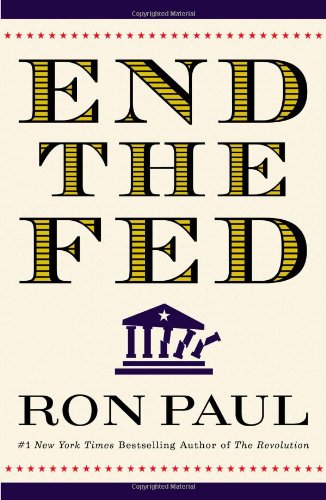“First they ignore you, then they laugh at you, then they fight you, then you win.” — Mahatma Gandhi
Mahatma Gandhi successfully sought the overthrow of tyrannical British rule in India via non-violent civil protests. In doing so, the above quote became synonymous with his name.
Basically, Gandhi’s quote outlines how new ideas are received by the special interests that the ideas threaten. For decades, Ron Paul has strived to expose the flawed Keynesian thought that dominates economic thinking in the United States–and most of the rest of the world.
 What Has Government Do...
Buy New $2.99
(as of 11:35 UTC - Details)
What Has Government Do...
Buy New $2.99
(as of 11:35 UTC - Details)
While a congressman, he was ignored, and his comments were never reported by establishment news media. Today, though, he has been promoted to the laughing stage.
None other than Paul Krugman, Nobel laureate and columnist for the New York Times, finds it necessary to ridicule Ron Paul and his supporters. In the July 25, 2015 NYT edition, Krugman wrote, “. . . because they’ve made some money over the course of their lives. . . they think they know from that experience what it takes to create wealth.
“They hear that the Fed is printing money, and it sounds to them like a violation of both the laws of economics and morality. . .”
Printing money is a violation of the laws of economics, as explained by Austrian economists, and it is a immoral act because is steals from
 Swords Into Plowshares...
Best Price: $4.00
Buy New $15.99
(as of 11:36 UTC - Details)
people who earn their money by selling products or services, not by “creating money out of thin air.”
Swords Into Plowshares...
Best Price: $4.00
Buy New $15.99
(as of 11:36 UTC - Details)
people who earn their money by selling products or services, not by “creating money out of thin air.”
Krugman goes on to say, “After all, Ron Paul has been making the same prediction year after year — in fact, he’s been making this prediction at least since 1981! — and has been wrong year after year.”
How in hell can Krugman write such dribble when the world is still suffering such a severe hangover from the 2008 World Financial Crisis? It almost brought down the world’s financial system and was directly attributed–even by economists who do not call themselves Austrians–to loose money policies.
It is not denied by anyone with two grey cells to rub together but that the worldwide collapse in the housing market was caused by loose
 End the Fed
Best Price: $1.12
Buy New $8.53
(as of 10:10 UTC - Details)
money. Remember the signs in your banks: “If you can afford to rent, you can afford to buy.” Proof of income was not required. Borrowers needed only to sign that they had minimum incomes that would support their loans.
End the Fed
Best Price: $1.12
Buy New $8.53
(as of 10:10 UTC - Details)
money. Remember the signs in your banks: “If you can afford to rent, you can afford to buy.” Proof of income was not required. Borrowers needed only to sign that they had minimum incomes that would support their loans.
Banks didn’t have to worry about whether the loans would be paid. They collected their fees and then packaged the loans and sold them to Fannie Mae and Freddie Mac, both of which went into bankruptcy because of bad loans. This illustrated perfectly how economic thinking is distorted by loose money.
The United States has had a loose money policy since Nixon “closed the gold window” August 15, 1971. “We are all Keynesians now,” Nixon gloated. (One might argue that Paul Volcker’s Fed hiking interest rates to 20 percent in 1980 was not a loose money period, but it was still a manipulated monetary policy, which can produce just as horrific results as manipulated low interest rates.)
 Against the State: An ...
Best Price: $5.02
Buy New $5.52
(as of 11:35 UTC - Details)
Not only does Krugman forget the WFC of 2008, he conveniently forgets the S&L crisis of the 1980s when a third of the nation’s S&Ls failed, and the FSLIC and the Resolution Trust Corporation closed or forced mergers of another 1,000 S&Ls.
Against the State: An ...
Best Price: $5.02
Buy New $5.52
(as of 11:35 UTC - Details)
Not only does Krugman forget the WFC of 2008, he conveniently forgets the S&L crisis of the 1980s when a third of the nation’s S&Ls failed, and the FSLIC and the Resolution Trust Corporation closed or forced mergers of another 1,000 S&Ls.
And, there was the Latin American debt crisis that blew up in the 1980s after loose money policies caused Latin American debt to balloon to amounts that could not be sustained. In that mess, the US engineered a $50 billion bailout of Mexico.
The effects spread to Asia, which required still more loose monetary policies that were used to bailout countries there. Also in the late 1990s, Russia defaulted on domestic debt and declared a moratorium on payment to foreign creditors.Long-Term Capital Management was another disaster brought on by loose money. LTCM was a hedge fund that collapsed in the late 1990s, leading to a Fed-forced $3.6 billion bailout. This bailout is memorable in that the Fed had to meet over a weekend to force our nation’s largest banks to pony up money to rescue a mere hedge fund.
Ron Paul is right. Loose money does lead to monetary crises. But, as Ron is quick to point out, he cannot say just when those crises will surface.
Paul Krugman, on the other hand, seems to think that they never occur. After all, if he doesn’t recognize the 2008 WFC, I doubt he will ever recognize a crisis.
Reprinted with permission from CMI Gold & Silver.




